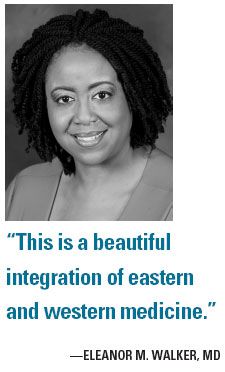Acupuncture matches antidepressant for vasomotor symptom relief
BOSTON-Acupuncture alleviates severe vasomotor symptoms as effectively as the antidepressant venlafaxine (Effexor) in breast cancer patients receiving anti-estrogen therapy, according to research from the Henry Ford Health System in Detroit.
BOSTON-Acupuncture alleviates severe vasomotor symptoms as effectively as the antidepressant venlafaxine (Effexor) in breast cancer patients receiving anti-estrogen therapy, according to research from the Henry Ford Health System in Detroit.

Women experiencing at least 14 hot flashes per week were randomized to 12 weeks of venlafaxine or 12 weeks of acupuncture. During treatment, decreases in vasomotor symptoms, depressive symptoms, and quality of life symptoms did not differ significantly between groups. Once treatment had been completed, symptoms took significantly longer to return to baseline levels in those who had received acupuncture, Eleanor M. Walker, MD, said at ASTRO 2008 (abstract 228).
“This is a beautiful integration of eastern and western medicine for the benefit of the patient,” said Dr. Walker, a radiation oncologist at Henry Ford. “It’s also an example of collaboration within a health system for patient benefit. It’s a holistic approach.”
Although many breast cancer patients prefer venlafaxine to steroid therapy for their vasomotor symptoms because the antidepressant is less likely to cause significant weight gain, the trade-off s can include such adverse effects as nausea, fatigue, and decreased libido. In the Henry Ford study, women treated with acupuncture had no negative side effects and reported increased energy, clarity of thought, sexual desire, and overall sense of well-being.
“It’s an important quality of life issue,” Dr. Walker said. “These are young women (median age 47) who were abruptly put into menopause, which is terrible.”
The results of the study may help bridge the chasm of uncertainty that has kept radiation oncologists from embracing complementary therapies, such as acupuncture.
“The uphill battle that, unfortunately, integrative medicine faces is that establishment physicians are not as open minded as they should be,” said Ramesh Rengan, MD, PhD, an assistant professor of radiation oncology at the University of Pennsylvania in Philadelphia. “This should go a long way toward getting people to accept acupuncture as a valid therapy.”
Several previous studies have compared therapeutic acupuncture to “sham” acupuncture, in which needles are placed at nonacupuncture sites. In the most recent of these studies, a randomized controlled trial out of Norway found that acupuncture more effectively reduced hot flashes and improved general health than sham therapy (Breast Cancer Res Treatment online, October 7, 2008). However, previous reports, including one from Memorial-Sloan Kettering Cancer Center, found no significant difference between therapeutic and sham acupuncture (JCO 25:5584-5590, 2007).
But because the Henry Ford study compared acupuncture with a therapy already commonly accepted by many physicians, it may be more valuable than a study using sham acupuncture. “This is in a sense like a phase III study, comparing acupuncture to a ‘gold standard’ and showing it’s equally effective,” Dr. Rengan said.
Dr. Walker and her colleagues are hoping that insurance companies, many of which do not currently cover acupuncture, agree with that assessment. Payers may be particularly swayed by the argument that acupuncture therapy may be more cost-effective because its eff ects last longer than those of venlafaxine therapy, she said.
But what’s most persuasive, she said, are the stories of the patients who have benefited from acupuncture therapy, patients like the young mother who had been experiencing 27 hot flashes per day.
“After two acupuncture treatments, her hot flashes decreased by half,” Dr. Walker said. “Her 10-year-old daughter came and gave me a big hug and thanked me for helping her mommy feel better.”